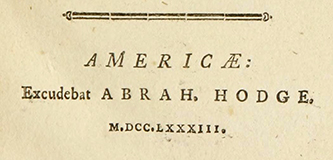1775–3 Aug. 1805

Abraham Hodge, state printer and Federalist activist, was born in the colony of New York in 1755. He had at least one sibling, a sister Elizabeth, who married John Boylan; they were the parents of William Boylan. Hodge may have been related to the New York printer Robert Hodge (1746–August 1813).
During the American Revolution, Hodge worked for Samuel Loudon, a patriot printer of New York who published the New York Packet and American Advertiser (later Loudon's New York Packet) and became the state printer of New York. Hodge also conducted George Washington's traveling press while the army was stationed at Valley Forge. Throughout the Revolution, he was noted for his dedication to spreading Republican principles and cheering his countrymen.
About 1784 or 1785, Hodge established a printing office in Halifax County, N.C. It is often said that he moved to North Carolina at the request of prominent citizens of the state. Hodge was elected state printer by the General Assembly in 1785. At various times during his career, he owned presses in Edenton, Halifax, Fayetteville, and New Bern.
With a partner, Andrew Blanchard, Hodge printed the State Gazette of North Carolina in New Bern from 17 Nov. 1785 to March 1788. In January 1786, he formed a brief partnership with the printer Silas W. Arnett to publish the Laws of the State of North Carolina. When the General Assembly met in Fayetteville in 1786–87, Hodge and Blanchard moved there to print the State Gazette. In 1788, Blanchard was replaced by Henry Wills, and the State Gazette moved to Edenton. Although the names "Hodge & Wills" continued to appear in the paper until 1795, the firm dissolved in 1793, when Hodge left for Halifax to publish the North Carolina Journal, a newspaper he had established in the summer of 1792. For many years the North Carolina Journal had the largest circulation of any newspaper in the state. It reflected Hodge's Federalist leanings and was often criticized for these unpopular views of government. Hodge continued to edit this paper until his death.
In the spring of 1796, the firm of Hodge & Boylan founded the North Carolina Minerva and Fayetteville Gazette. William Boylan, the son of Hodge's sister, had come to the state from Pluchamine, N.J., as a youth. In 1798, a law requiring the state printer to live in the capital city was passed; accordingly, Hodge & Boylan moved its presses to Raleigh in 1799 and renamed the newspaper the North Carolina Minerva and Raleigh Advertiser.
Hodge's outspoken Federalist views brought him a violent confrontation with Thomas Blount in the summer of 1798. Hodge had published several anonymous handbills and newspaper accounts degrading the character of Blount, a Republican candidate for Congress. When Hodge refused to name the author of the articles, Blount attacked him, hitting Hodge several times with his cane.
Hodge and his partners served as state printers from 1785 to 1800 uninterrupted, except in 1798 when Allmond Hall held the office. In 1800, Joseph Gales, backed by Blount and other staunch Republicans, won the office. Hodge continued to publish the Minerva until he retired in 1803.
Abraham Hodge died in Halifax. He probably never married, as William Boylan was his sole heir and executor of his will. Besides his fifteen-year-service as state printer, Hodge was involved in five firms and he established three newspapers. He printed religious publications and his own North Carolina Almanac (1794). In addition, he was one of the first men in the state to contribute to the library of The University of North Carolina.